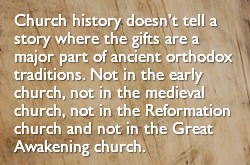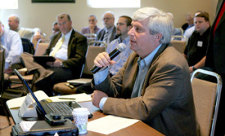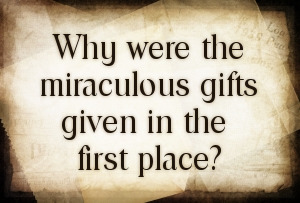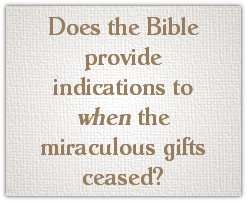Reflections on Strange Fire and the Problem of Continuationism

John MacArthur proved once again why his ministry has endured and has the kind of influence that few men ever attain. Last week the folks at Grace held the Strange Fire conference. Unfortunately I was not able to attend and I heard only bits and pieces of the live stream. I hope to listen to the entire conference as I travel to Romania this week for a graduation next Sunday. Some may think that posting a piece on the conference without having heard much of it is premature. But let me say thank you to John and the men and women who endured the opprobrium of the Charismatics to bring some needed criticism to a movement that has created no small amount of international controversy. Most American Christians are only familiar with the Charismatic movement’s American permutations. As pernicious as some of these are, the international manifestations are far worse. For this reason, the conference was a necessary warning. Let me explain.
In recent years, I have made 18 trips abroad to countries as diverse as Zambia, India, Romania, Russia and the Ukraine. Pentecostalism and the Charismatic movement have reached all of these places, with some very devastating effects. It should be noted that from a historical standpoint, nearly all world Charismaticism is rooted in early American Pentecostal sources that have been exported around the world. Modern international developments may be indigenous, but most of the early ideas came from early 20th century American Christianity.
Discussion
Cessationism: What Is the Issue?
Discussion
Signs? Prophets? Miracles?
 Reprinted with permission from Baptist Bulletin Sep/Oct 2013. All rights reserved.
Reprinted with permission from Baptist Bulletin Sep/Oct 2013. All rights reserved.
Council on Dispensational Hermeneutics meets
CLARKS SUMMIT, Pa.—“Traditional dispensationalists do not have a place where we can go to talk to each other,” says Mike Stallard as he welcomes the Council on Dispensational Hermeneutics, meeting on the campus of Baptist Bible Seminary, Clarks Summit, Pa.
Stallard, the seminary dean, is explaining why the council was formed in 2008, and why the steering committee has planned two days of talk. Lots of talk.
Thirty theologians sit at the front of the room at long tables, members of the council. Most of them have their laptops open, looking at papers while the author reads them to the group. The wonky presentation style is familiar to anyone who has attended an academic conference, except the schedule leaves plenty of time for questions. Stallard describes it as “more of a discussion group than a presenter group.”
Discussion
"Phonity. noun: superficial unity for which fundamental differences are ignored."
Body
“As long as Reformed—which I assume to be cessationist*—and Charismatic Christians continue to pretend the differences between them are minor and sweep them under the couch, their unity is fake, false, phony, fraudulent, and fraught with failure.” Phonity
Discussion
Miraculous Gifts: If They Ceased, Why?
 So far in this study of cessationism (Part 1, Part 2, Part 3), we have considered the what question and the when question. Per the what question, cessationists conclude that what took place in the New Testament (with regard to the miraculous gifts) is not happening in the church today—even if charismatics are using biblical terminology to refer to non-biblical practices.
So far in this study of cessationism (Part 1, Part 2, Part 3), we have considered the what question and the when question. Per the what question, cessationists conclude that what took place in the New Testament (with regard to the miraculous gifts) is not happening in the church today—even if charismatics are using biblical terminology to refer to non-biblical practices.
Discussion
Miraculous Gifts: If They Ceased, When?

This study of cessationism considers three essential questions. Focusing on the gift of tongues, Parts 1 and 2 addressed the first of these: What were the gifts in the New Testament, and how does that biblical description compare to what is happening in contemporary charismatic circles? When we approach the continuationist/cessationist debate by first defining the gifts biblically, it becomes apparent that modern charismatic practice does not match the New Testament phenomena.
The second essential question is the when question. If the miraculous gifts (biblically defined) are not occurring in the church today, then does the Bible provide indications to when those gifts ceased?
For the sake of space, this question will be addressed only briefly. Those interested in further study on this issue should read Satisfied by the Promise of the Spirit by Thomas Edgar.
In interacting with the when question, six texts must be considered. Many of these texts are used by continuationists to argue for the ongoing nature of the charismatic gifts.
Discussion
Addressing the Charismatic Question, Part 2

This study of cessationism focuses on three essential questions. Focusing on the gift of tongues, Part 1 began to address the first of these: What were the gifts in the New Testament, and how does that biblical description compare to what is happening in contemporary charismatic circles?
Seven similarities provide strong evidence that the gift of tongues in Acts was the same gift of tongues in view in 1 Corinthians 12–14. In Acts and 1 Corinthians, tongues share the same source, recipients, substance, terminology and primary purpose. They also share the same connection to the other gifts and the same reaction from unbelievers.
Several additional exegetical comments might be made about the gift of tongues:
1. Some, not all
First Corinthians 12:8–11 and 27–31 make it unmistakably clear that not everyone received the gift of tongues (cf. 14:26). Note that there is no contextual or grammatical warrant for seeing 1 Corinthians 12 as one type of tongues (that only a few receive) and 1 Corinthians 14 as a different type (that everyone is to receive). Along those lines, Paul’s statement in 1 Corinthians 14:5 (“Now I wish that you all spoke in tongues”) is almost identical to his earlier statement in 7:7 regarding singleness. (“Yet I wish that all men were even as myself”). Thus, Paul’s wish does not indicate that everyone in the Corinthian congregation actually spoke in tongues.
Discussion
Addressing the Charismatic Question
 The following is adapted from seminars given at The Shepherds’ Conference with help from Voice magazine. Used by permission.
The following is adapted from seminars given at The Shepherds’ Conference with help from Voice magazine. Used by permission.
Historically speaking, evangelical Christians (from Martin Luther to Jonathan Edwards to Charles Spurgeon) have held to a cessationist position. They believed the miraculous spiritual gifts of the New Testament era ceased shortly after the first century. Contemporary cessationists include names like John MacArthur, R. C. Sproul, Sam Waldron, and Richard Gaffin.
It is important to note, at the outset, that cessationists do not deny the possibility of miracles in the general sense of special acts of divine providence. Rather, cessationism limits its focus to the miraculous and revelatory gifts of the Holy Spirit, contending that those specific gifts did not continue after the apostolic era came to an end.
With the birth of Pentecostalism in 1901, followed by the Charismatic Renewal in the 1960s and especially the Third Wave in the 1980s, the evangelical camp found itself divided in its view regarding charismatic gifts. A number of widely-read evangelical pastors and theologians (like Wayne Grudem, Sam Storms, and C. J. Mahaney) have been outspoken about their continuationist views. As evangelical charismatics, they believe the miraculous gifts of the Spirit did not cease and are still in operation today. Other well-known leaders (such as John Piper, Mark Driscoll, and James MacDonald) have also expressed openness toward the idea that the miraculous gifts are still operational.
In assessing any theological position, it is vital to begin with the Word of God. If we are to rightly understand the gifts of the Spirit we must start by going to the Scriptures which He inspired.

Discussion